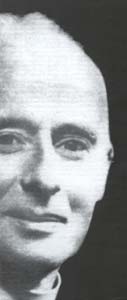
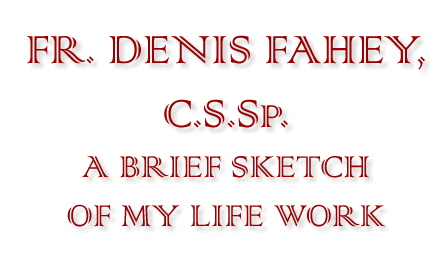
From 1906, I studied for a degree in Civil and Constitutional History, Political Economy, etc. I loathed the anti-Catholic spirit and doctrine of a number of the books I had to study, especially the History course. In 1908 I was sent to Rome. In 1909, the Director of the Roman Scholasticate was the late Fr. Marc Voegtle, C.S.Sp., a very able and lovable man, who had been Provincial of France. I told him about my History course and, during the following years, he put on two books to be read in the refectory: Les Origines de la Civilisation Moderne (in two volumes) by Godefroid Kurth, the Belgian historian, who had been brought to Rome by Pope Leo XIII see also by the same author The Workingman's Guilds of the Middle Ages available from Angelus Press. Price: $3.00-Ed.], and Les Societes Secretes et la Societe by Fr. Deschamps, S J. The former, one of the best books ever written, showed the Mystical Body of Christ transforming the pagan society of the Roman Empire and preparing the upward movement of recognition for the program of Our Lord Jesus Christ, Priest and King. The latter showed that the revolutions of the modern world "were but one phase of the development of a pre-arranged plan, which is being carried out over an ever-widening area to multiply the ruins of which we have previously spoken" (Pope Leo XIII, review of Our Pontificate, Mar. 19, 1902). I understood that all the revolutions were bringing about the elimination of the rule of Christ the King in view of ultimately eliminating the Mass and the supernatural life of Christ, the Supreme High Priest. These two books furnished me with the two guiding lights of theological and historical studies which I have pursued ever since.
Christ Our Head Is Both Priest and King
On the one hand, I tried to get acquainted with the full doctrine of our relation to Our Lord in His Mystical Body. Gradually I came to see that Our Lord, Priest and King, came down to proclaim His program for the restoration of order in the world, prepared to die if that program was rejected. His program was rejected by His own nation, which had been chosen to receive Him and to be the heralds of His Mystical Body, super-natural and supra-national, to the world. From Him as Priest crucified comes the supernatural life of the Body, and, as King, He proclaims His program for the organization of society so as to favor the diffusion of the supernatural life of the Mystical Body. His program is not merely the negative one of avoiding sin, but the positive one of promoting an organization of society that will favor the diffusion and preservation of the supernatural life of the members of Christ. Christ's priesthood and Christ's kingship are to be distinguished, but they are not meant to be separated. Every member of Christ-in union with Christ as priest at Mass-promises to strive to realize the program of Christ the King in the world to the best of his ability.
In history, I saw that early Catholics preached the full doctrine of membership of Christ and did not remove one jot nor tittle of His claims as King, though they did not have available to them all the points of His positive program set forth in papal encyclicals as we have. Little by little, through union at Mass with Christ as priest, the world of Western Europe in the 13th century was brought to acknowledge the program of Christ as King. The acknowledgment was defective in ways, but it was real. Since then, there has been steady decay, and that decay has been accelerated since the French Revolution (1789) by the action of those organized secret forces upon which Pope Leo XIII and Pope Pius XI insist. For example, Pope Leo XIII in the encyclical letter Humanum Genus on Freemasonry available from Angelus Press. Price: $3.45, points out that Freemasonry, "animated with the incorrigible perfidy and hypocrisy of Satan and his fellow-demons" is working directly against five out of the six principal points of Our Lords's program. That will be developed later. I must return to the story of my studies and my meditations.
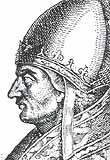 |
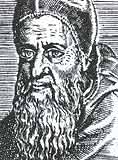 |
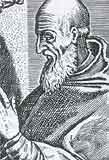 |
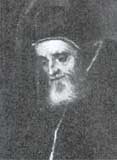 | ||||
| INNOCENT III (I 198-1216) Temporal power of the papacy at its height. Helped St. Francis and St. Dominic begin their Orders. | JULIUS III (1551-55) Founded German theological college to counteract Protestant revolt. | ST. PIUS V (1566-72) Worked to reform the clergy and bishops. Declared St. Thomas Aquinas a Doctor of the Church; patronized Palestrina and codified the Mass. | PAUL IV (1555-59) Austere, orthodox reformer; swept the Vatican clean of politics. Intolerant of clerical scandal. |
The Tomb of St. Peter
One of the books that enabled me to grasp the meaning of the Kingship of Christ and see the horror of the liberalism of so much of my previous studies was the second volume of De Ecclesia by Fr. (later Cardinal) Billot, S J. I went over it twice during my stay in Rome, and at least twice more after that. That does not mean that I simply read it. No, I have gone over it between four and five times in mental prayer, asking Our Lord to help me to understand it and teach it and live it. Cardinal Pie's works, so strongly recommended by Pope Pius X to the students of the French Seminary, also helped me. That saintly Pope said on another occasion that he hardly ever passed a day without reading some of Cardinal Pie. The works of Cardinal Pie are virtually unavailable to the English-speaking world. They are in French, awaiting a monumental effort of translation. How helpful they would be to the cause of Catholic Tradition.-Ed.] At least two long passages from his encyclicals are taken almost textually from the Cardinal's writings. I was delighted when a summary of the great Cardinal's teaching on the social reign of Christ appeared in 1924. That, too, I have read and meditated upon at length. It is to Cardinal Pie that I owe the understanding of the full meaning of 'Thy Kingdom come' in the Our Father:
Our Lord's Kingdom is meant to come, not only in individual souls and in heaven, but on earth through the submission of States and Nations to His rule ....The dethronement of God on earth is a crime, to which we must never become resigned. Let us never cease to protest against it.
I have printed most of the passage in The Kingship of Christ and Organized Naturalism (p.124) available from Christian Book Club of America, Palmdale, CA 93590. But the Syllabus of Errors of Pope Pius IX available from Angelus Press. Price: $3.45 and the encyclicals of the last four popes [i.e., Leo XIII, Pius X, Benedict XV, Pius XI-Ed.] have been main subjects of my meditations on the Kingship of Christ and its relation to His priesthood.
When in Rome I began to realize more fully the real significance of the history of the world as the account of the acceptance and rejection of Our Lord's program for order. I used to ask permission to remain at the Confession of St. Peter the place in St. Peter's directly above the tomb of St. Peter-Ed.] while the other scholastics went sightseeing round the Basilica. I spent the time there going over the history of the world, and I repeatemised St. Peter that if ever I got the chance I would teach the truth about his Master in the way he and his successors, the Roman pontiffs, wanted it done. That is what I have striven to do and am doing. My reaction against the disgusting books of my B.A. course was strengthened by the fact that I lived in Rome during the struggle against Modernism and its naturalistic separation of the "historian" and the "believer." See this distinction anathematized by Pope Pius X's Oath Against Modernism.-Ed.]
The Program of Christ the King
In my books, for example, in The Kingship of Chris and Organized Naturalism and The Tragedy of James Connolly, I have set forth in outline from the papal encyclicals the program of Christ the King. It comprises six points. Five of these are:
- Our Lord's
Mystical Body, the Catholic Churcl supernatural and supranational, which
all States and Nations are called upon to acknowledge as the only way
established by God for ordered return to Him.
- The indirect power
of the one True Church.
- The unity and
indissolubility of marriage.
- Education of
children as members of Christ.
- Wide diffusion of ownership of property. The texts of the papal encyclicals concerning these points are in my books The Mystical Body of Christ and the Reorganization of Society Christian Book Club of America, Palmdale, CA 93590 and The Kingship of Christ and Organized Naturalism so that I need not insist that, when I am speaking of these points, I am simply giving what the sovereign pontiffs have taught.
The sixth point needs to be developed as the texts seem to be less familiar. First of all, both the fifth and sixth points deal with the production, distribution, and exchange of those material goods of which a sufficiency is normally necessary for the virtuous life o human persons. Both Pope Leo XIII and Pope Pius XIl insist upon those points in Rerum Noaarum and Q,uadragesimo Anno available from Angelus Press. Prices: $1.25 and $3.50 respectively. The sixth point i that, as the art of money manipulation in the hierarchy of the arts is inferior to the industrial arts which cater for man's secondary needs and to agriculture which produces man's primary needs, all those arts are mean to be at the service of members of Christ in happy families. Nowadays, families and human beings are sacrificed for production, and production itself is sacrificed for money. This reversal of order, which is the result of liberalism, is treated at great length by Pope Pius XI in Q,uadragesimo Anno. The Pope goes to the origin of that reversal of order, that is, he explains why those who manipulate money are allowed to come to dominate. He writes:
A stern insistence on the moral law, enforced with vigor by the civil authority, could have dispelled or perhaps averted those enormous evils. This, however, was too often lamentably wanting. For at the time when the new social order was beginning, the doctrines of rationalism had already taken firm hold on large numbers, and an economic science alien to the true moral law had soon arisen, whence it followed that free rein was given to human avarice Daughters of St. Paul Edition, p.65].
That economic science to which the Pope refers was liberalism, itself very largely the result of the nominalist and separatist philosophy of John Locke and Stuart Mill, both of whose works are on the Catholic Index. What is liberalism?-It can best be described by saying that it consists in erecting some particular section or aspect of human activity, economic or political, into a separate domain with its own autonomous end, completely independent of the final end of man as a member of Christ. Economic affairs, including, of course, the manipulation of money or exchange medium, are governed by physical laws of nature, to which no political law should attempt to do violence. In Quuadragesimo Anno, Pope Pius XI shows, as a consequence, man being sacrificed to production: "Dead matter leaves the factory ennobled and transformed, where men are corrupted and degraded." He speaks of production being at the mercy of those who manipulate money:
This power [of domination] becomes particularly irresistible when exercised by those who, because they hold and control money, are able also to govern credit and determine its allotment, for that reason supplying so to speak, the life-blood of the entire economic body, and grasping, as it were, in their hands the very soul of production, so that no one dare breathe against their will [ibid., p.50].
Further on Pope Pius XI speaks of the deadly and detestable "internationalism" or "international imperialism" of money. Pope Pius XI's language is very strong. So is Pope Leo XIII's in Rerum Novarum.
Working men have been surrendered, all isolated and helpless, to the hard-heartedness of employers and the greed of unchecked competition. The mischief has been increased by rapacious usury, which, although more than once condemned by the Church, is nevertheless, under a different guise, but with the like injustice, still practiced by covetous and grasping men ...so that a small number of very rich have been able to lay upon the teeming masses of the laboring poor a yoke little better than slavery itself.
The disordered domination of money manipulation in social organization leads inevitably to wrong scales of values in the minds of the people. I have occasionally given examples of this in Church History class, as it is disastrous for the life of members of Christ. Pope Pius XII has developed all these ideas in his allocution to the Congress of Italian National Federation of Tillers of the Soil (Nov. 15, 1946) [which you should compare to "The Seven Principles of the New Radicalism" elsewhere in this Angelus-Ed.]:
Modern cities, with their continual increase in size and their agglomerations of inhabitants are the typical produce of the domination of large-scale capital over economic life, and not only over economic life but over human beings themselves. As our illustrious Predecessor in his encyclical letter Quadragesimo Anno has efficaciously pointed out, it happens only too often that human needs according to their objective importance in the natural order no longer regulate economic life and the employment of capital, but, on the contrary, finance capital and its desire for gain determine what needs are to be satisfied and in what measure. Accordingly, it is not human labor destined for the common good that draws capital to itself and disposes of it, but finance-capital moves productive labor and men hither and thither like tennis-balls.
If the city dweller suffers from this state of things so contrary to nature, it is all the more opposed to the essence of the countryman's life. Since, notwithstanding all the difficulties, the tiller of the soil still represents the natural order willed by God, namely, that man should by his labor dominate over material things, instead of material things domination over man.
This is therefore the profound cause of the present-day conflict between town and country. They form men of different mentalities. The opposition becomes all the greater the more capital, abdicating its noble mission of promoting the good of society in each of the families that compose it, enters into the world of the tillers of the soil and involves them also in the same evils. It holds up before the dazzled eyes of the country worker the bait of money and of a life of pleasure, in order to induce him to abandon the land and waste in the city, which mostly brings him merely deception in not only whatever savings he had laboriously accumulated, but also frequently health, strength, joy, honor, and life itself. Finance capital hastens to take over the deserted countryside, and the land then becomes not an object of loving care, but of cold, calculating exploitation.
In all this allocution of which I have quoted only a small portion and in another letter [the pope wrote] to a Canadian Social Week, the Holy Father has said far more than I have ever said.
In the outline of history, which I give almost every year at the beginning of the year, I try, for the minds of the scholastics, to judge historical epochs and movements, programs of politicians, as well as ideas of authors placed in the hands of pupils for the study of languages and of history, by reference to the six points of Our Lord's program. Whatever is in harmony with the Divine Program for Order will make for real progress, whatever is opposed to it spells decay and death. Thus I try to train them to make Our Lord the center of their lives in every department.
Having made it clear that, when I am speaking of the disordered domination of money, I am simply using the language of the sovereign pontiffs, I now pass on to the papal pronouncements about the Jewish nation and freemasonry.
The Jewish Nation
I am acquainted with about sixty encyclical letters, bulls, and decrees of General Councils concerning the Jews dating between 1159 and 1755. As I point out in my book, The Mystical Body of Christ and the Reorganization of Society, two currents run through these official declarations. On the one hand, in a certain number of documents the sovereign pontiffs strive to protect the Jews from physical violence and to secure respect for their family life and their worship. On the other hand, they aim unceasingly in the greater number of documents at protecting the supernatural life of Catholics from the contamination of Jewish naturalism and try to prevent the Jews from gaining control over Catholics. I procured for study and meditation six of the chief documents, namely, those of Julius III (Cum Sicut Nuper, 1554), Paul IV (Cum Nimis Absurdum, 1555), St. Pius V (Hebraeorum Gens, 1569), Gregory XIII, Clement VIII (Caeca Et Obdurata, 1593), and Benedict XIV (A Quo Primum, 1751). I have completed the translation of four of them, namely, those of St. Pius V, Gregory XIII, Clement VIII, and Benedict XIV From the documents promulgated by the popes during 600 years, let us now take a few expressions of the Church's concern for the protection of the life of the Mystical Body of Christ against the Jewish hatred of the supernatural. That concern is ever the same in all ages. The combat against naturalism in general and, therefore implicitly against the organized naturalism of the Jewish nation is ur ed upon us, for example, by Leo XIII (Tametsi, 1900 and Pius XI (Q,uas Primas, 1925; Quadragesimo Anno, 1931). [ Q,uas Primas available from Angelus Press. Price: $1.25. We are warned against Jewish naturalism explicitly in a whole series of papal documents quoted by Pope Benedict XI, the learned pontiff and great canonist:
As for us in this matter, as in all others, We follow the line of conduct adopted by Our Venerable Predecessors, the Roman Pontiffs. Alexander III (1159-1181) forbade Christians, under severe penalties, to enter the service ofJews for any lengthy period or to become domestic servants in their households. "Thee ought not," he wrote, "to serve the Jews for pay in the permanent way."
The same Pontiff explains the reason for this prohibition as follows:
Our way of life and those of theJews are utterly different, and theJews will easily pervert the souls of simple folk to their superstition and unbelief, if such folk are living in continual and intimate converse with them.
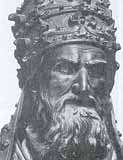 |
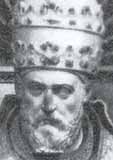 |
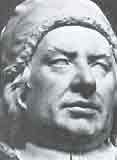 |
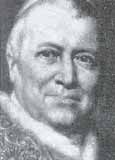 | ||||
| GREGORY XIII (1572-85) Founded Gregorian College, Rome; introduced Gregorian calendar. Continued leadership of Catholic reform. | CLEMENT VIII (1592-1605) Promoted Forty Hours Devotion; revised the Breviary: a leading missionary pope. | BENEDICT XIV (1740-58) Approved Redemptorists. Condemned usury, Voltaire, and Jansenism. | PIUS IX (1846-78) Declared Dogma of the Immaculate Conception. Wrote Syllabus of Errors condemning Liberalism. Summoned Vatican Council I which defined papal infallibility. |
Innocent III (1198-1216), after having mentioned that the Jews were being admitted by Christians into their cities warned Christians that the mode and condition of admission should be such as to prevent the Jews from returning evil for good: "When they are thus admitted out of pity into familiar intercourse with Christians, they repay their hosts, as the proverb says, like the rat hidden in the sack, or the snake in the bosom, or the burning brand in one's lap ...." In like manner, in another decretal, Cum Sit Nimis, he forbids public positions to be bestowed on the Jews: "We forbid the giving of public appointments to Jews, because they profit by the opportunities thus afforded them to show themselves bitterly hostile to Christians." Pope Gregory XIII warned Catholics in 1581 that the Jewish attitude towards Our Lord had not changed:
The sovereign pontiffs, ever anxious for the conversion of theJews, have received them kindly, have graciously allowed them to dwell amongst their own subjects and have always striven with pius zeal to draw them to the light of truth. In addition, they have helped them to secure the necessities of life, have forbidden all to injure or insult them and to their benevolence have bestowed many privileges upon them for their protection. The Jews, however, in no way softened by these benefits, and with their ancient anti-Christian attitude unchanged, do not cease, in their synagogues and everywhere, to rage against Our LordJesus Christ now gloriously reigning in Heaven. Moved by an intense hatred of the members of Christ, they continue to plan horrible crimes against the Christian religion with daily increasing audacity ....
Pope St. Pius V expelled the Jews from the whole territory of the Papal States except Rome and Ancona. In the letter Hebraeorum Gens he explains why he did so:
Their wickedness, which has been developed by every evil art, has now reached such a point that, in view of our common safety, We feel it expedient to check the spread of such a disease by applying a speedy remedy ....We have clear and definite proof how this perverse race hates the name of Christ, how hostile they are to all who bear His name and by what tricks and frauds they plot against the lives of Christians ....
Finally, in the encyclical letter ,Studiorum Ducem, Pope Pius XI says that St. Thomas Aquinas is "our source for economic and political science." Now in his commentary on the Epistle to the Galatians 4:29 "But as then he, that was born according to the flesh, persecuted him that was after the spirit; so also it is now."], St. Thomas warns his readers that "from the beginning of the primitive Church the Jews persecuted the Christians, as is evident from the Acts of the Apostles, and they would do the same even now if they could."
[At this point, Fr. Fahey interjects some facts about the control of "cinema world" by Jewish entrepreneurs, naming those who controlled the eight major film companies at the time. He quotes from International Events (Jan., 1933): "These are the men who are educating millions of our American children to be criminals and to scoff at the Christian religion."-Ed.]
Now go over again the texts of the popes I have quoted above and then meditate upon the fact that according to The Brooklyn Tablet (May 31, 1947), the Very Rev. Mgr. John J. McClafferty, Executive Secretary of the League of Decency, issued a warning:
A notable retrogression is taking place in the moral quality of motion pictures. The light of the screen, as a death ray of disintegration, is assaulting the family, the fundamental unit of society.
He suggested an agreement among members of the Motion Picture Association not to purchase story material containing immoral matter.
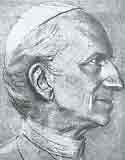 |
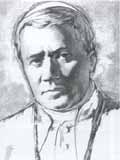 |
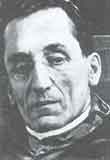 |
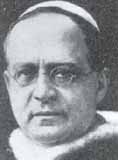 |
|||||
| LEO XIII (1878-1903) Wrote Rerum Novarum and other social encyclicals which served as the basis for the Church's social teaching and action. Condemned Freemasonry. | ST. PIUS X (1903-14) Encouraged frequent Communion and lowered age for its reception. Wrote encyclical Pascendi against the modernists. | BENEDICT XV (1914-22) Promulgated new code of canon law. |
PIUS X1 (1922-1939) A voice for peace. Wrote encyclicals on education, marriage and the Social Kingship of Christ. |
Freemasonry
Fr. E. Cahill, S J., begins Chapter 6 of his book Freemasonry and the Anti-Christian Movement by stating that
the Papal condemnations of Freemasonry are so severe and sweeping in their tenor as to be quite unique in the history of Church legislation. During the last two centuries Freemasonry has been expressly anathematized by at least ten different Popes and condemned directly or indirectly by almost every pontiff that sat on the Chair of St. Peter. The popes charge the Freemasons with occult criminal activities, with "shameful deeds," with worshipping Satan himself (a charge which is hinted at in some of the papal documents), with infamy, blasphemy, sacrilege, and the most abominable heresies of former times; with the systematic practice of assassination; with treason against the State, with anarchical and revolutionary principles and with favoring and promoting what is now called Bolshevism; with corrupting and perverting the minds of youth; with shameful hypocrisy and lying, by means of which Freemasons strive to hide their wickedness under a cloak of probity and respectability, while in reality they are a very "synagogue of Satan," whose direct aim and object is the complete destruction of Christianity.
He goes on to give a brief summary of the differen encyclicals dealing with freemasonry since the first in 1738. See also Fr. Cahill's comprehensive The Framework of a Christian State available from Angelus Press. Price: $49.95. I have studied and meditated upon the Letters of Leo XII (Quo Graviora, 1826); Pius IX (Exortae In Ista Ditione, 1876; Multiplices Inter, 1865); Leo XIII (Humanum Genus, 1884; Parvenu a la vingtcinquieme annee, 1902); Pius XI (Divini Redemptoris, 1937; The Persecution of the Church in Slain, 1938). [Quo Graviora and Diaini Redemptoris are both available from Angelus Press. Prices respectively: $3.45 and $4.25.] I have translated the whole of the encyclical letter Humanum Genus, going over it four times in all, and large portions of the others. Both in my books and in my rare allusions to freemasonry in the classroom, I have striven to bring out the naturalism or, rather, antisupernaturalism of the association. I have used expressions such as the following of Pope Leo XIII from his encyclical letter Humanum Genus:
But as it befits the authority of Our office that We Ourselves should point out some suitable way of proceeding, We wish it to be your rule first of all to tear away the mask of Freemasonry, and to let it be seen as it really is; and by sermons and Pastoral Letters to instruct the people as to the artifices used by societies of this kind in seducing men and enticing them into their ranks, and as to the depravity of their opinions and the wickedness of their acts, win men over and induce them to join their ranks. Show them also the perversity of their naturalistic doctrines and the wickedness of its acts. As Our predecessors have many times repeated, let no man think that he may for any reason whatsoever join the Masonic sect, if he values his Catholic name and his eternal salvation as he ought to value them. Let no one be deceived by pretense of honesty. It may seem to some that Freemasons demand nothing that is openly contrary to religion and morality; but, as the whole principle and object of the sect lies in what is vicious and criminal, to join with these men or in any way to help them cannot be lawful ....
Let us take as our helper and intercessor the Virgin Mary, Mother of God, so that she, who from the moment of her conception overcame Satan, may show her power over these evil sects, in which is revived the contumacious spirit of the demons, together with his unsubdued perfidy and deceit. Let us beseech Michael, the prince of the heavenly angels, who drove out the infernal foe; andJoseph, the spouse of the Most Holy Virgin, and heavenly Patron and of the Catholic Church; and the great apostles, Peter and Paul, the father and victorious champions of the Christian faith. By their patronage, and by perseverance in united prayer, We hope that God will mercifully and opportunely succor the human race, which is encompassed by so many dangers (pp.24,28).
In his apostolic letter of 1902, the aged Pontiff refers to the encyclical letter Humanum Genus just quoted:
We denounced Freemasonry's destructive tendencies, erroneous doctrines and pernicious aims. We pointed out that it has cast its net over almost all nations and has succeeded in establishing relations with other associations which it moves by its hidden influences. It first attracts its adherents and then holds them by the advantages it procures for them. By binding rulers of States to its designs, sometimes by promises and sometimes by threats, it has succeeded in penetrating into all ranks of society. Thus it forms an invisible and irresponsible State within the body corporate of the lawful State. Full of the spirit of Satan who, according to the expression of the Apostle, knows how to transform himself into an angel of light when he wants to do so, Freemasonry pretends that its object is humanitarian. Yet it sacrifices everything to its sectarian designs. It proclaims that it has no political aims: yet in reality it exercises an enormous influence on the legislative and administrative life of States. Loudly professing respect for the authority and even for religion itself, its ultimate object, as its own statutes bear witness, is the extermination of sovereigns and priests in whom it sees an enemy of liberty.
And we must not forget that Pope Pius XI on more than one occasion warned the world that the papal condemnations apply to Masonry everywhere and that Pope Leo XIII, when speaking about the controversy concerning God among the Masons, makes no distinction between the condemning factions.
Action of Freemasonry in the Press in Favor of Communism
Pope Leo XIII writes:
Yea, this change and overthrow [of the well-constituted State] is deliberately planned and put forward by many associations of Communists and Socialists; and to their undertakings the sect of Freemasons is not hostile, but greatly favors their designs, and holds in common with them their chief opinions (Humanum Genus, p.21).
There is strong evidence that all the agents of the two Russian Revolutions were Masons. The evidence is in my books as well as the text of Pope Pius XI stating that Russia, Mexico, and Spain were the work of secret societies. Pope Leo XIII wrote in his apostolic letter of 1902 [already quoted that:
the continual troubles with which the Church is harnessed and the renewed vexations of which She has quite recently been the object are mainly due to the inspiration and the cooperation of the association. There are numerous evidence of this ....All this points, without a shadow of doubt, to a concerted line of action, and to the direction of all these activities by one central authority. These events are, in fact, but one phase in the development of a prearranged plan, which is being carried out over an ever-widening area, to multiply the ruins of which We have previously spoken. Thus Freemasonry is striving first to restrict and then to exclude completely religious instruction from the schools ....By means of the daily press, it is endeavoring to combat Catholic morality....
In the encyclical letter [Divini Redemptoris] on Atheistic Communism (1937), Pope Pius XI stressed the alliance between secret societies and the Communistic movement and also the influence of secret forces upon the press of the world.
Another factor which has powerfully contributed to the spread of Communism is certainly to be found in the fact that a great part of the daily press of the world, which does not accept Catholic precepts and principles, of set purpose never mentions Communism. We say of set purpose, for otherwise it is not easy to understand how these writers who so eagerly seize upon and publish accounts of events of less importance have so long remained silent about the atrocious crimes perpetrated in Russia, Mexico, and a great part of Spain; and how they have so little to say, considering the importance of the matter, about the Communist Association which is in power in Moscow and which has ramifications far and wide all over the world. All are aware that this silence is due, in great part to an imprudent political policy; and also that favored and recommended by secret forces which have long been working for the overthrow of the Christian organization of States.
Love of Papal Teaching
I have always striven to inculcate love of papal teaching in the future fathers of the Congregation, and of all the Papal Encyclicals. This is what Pope Pius XI insists upon in his encyclical, LTbi Arcano Dei:
How many there are who accept and profess the Catholic teaching in matters regarding civil authority and the duty of obeying it, regarding the rights of property or the rights and duties of agricultural laborers, the mutual relations between States or between employer and employed, regarding the relations between the ecclesiastical and civil power, the rights of the Holy See and the Roman Pontiff, the prerogatives of Bishops, and finally, the rights of the Creator, Redeemer and Lord, Christ Himself over men and nations: and yet these, by the spoken and written word, and in their whole manner of life, act as if the teaching and oft-repeated precepts of the sovereign pontiffs, Leo XIII, Pius X, and Benedict XV had lost their efficacy or were completely out of date. In all this We recognize, a kind of moral, juridical and social modernism. These teachings and precepts to which We have referred must be insisted upon, and the ardor of faith and divine charity, which alone can secure their proper understanding and observance, must be aroused in the souls of all men. In the education of Christian youth it is Our wish that these things be particularly attended to especially in the case of those who aspire to the Holy Orders, lest, amidst the turmoil of social order and general confusion of ideas, they may be, as the Apostle says, "carried away with every wind of doctrine, by the wickedness of men, by cunning craftiness by which they lie in wait to deceive."
Recently I was informed that the theologians petitioned last year to have the papal encyclicals read in the refectory at a couple of meals a week at least. I am sorry that the petition was not granted, and I intend to renew it personally every year as long as I live. The fathers of the Congregation must know the papal encyclicals and be able to set forth their teaching in the newspapers, which are so badly needed in our mission. The encyclicals that deal with the organized anti-supernatural or naturalistic forces, secret or nonsecret, as well as others, must be known. Though the knowledge of the aims and the methods of those organized forces, on which the popes so strongly insist, does not suffice to explain everything in contemporary history, yet without that knowledge contemporary history is a puzzle, and the fathers will not be able to battle for the rights of Christ the King as they should.
In his encyclical letter on the third centenary of St. Francis de Sales (Jan. 26, 1923), Pope Pius XI warns Catholic writers that
before everything else they should study with the greatest diligence and strive to possess a knowledge of Catholic doctrine; that they should be on their guard against minimizing that doctrine, lest under cover of avoiding offense to adversaries, they attenuate it or conceal it.
My Teaching of Philosophy
For a good many years now, in accordance with the encyclical letter on restoring Christian philosophy, Aeterni Patris, of Pope Leo XIII available from Angelus Press. Price: $1.75, I have been trying to apply the philosophy of St. Thomas Aquinas to the refutation of some of the erroneous doctrines that are working havoc in the world. In that encyclical, the great Pope writes:
Whoso turns his attention to the bitter strifes of these days and seeks a reason for the troubles that vex public and private life must come to the conclusion that a fruitful cause of the evils which now afflict, as well as those which threaten us, lies in this: that false conclusions concerning divine and human things, which originated in the schools of philosophy, have crept into all the orders of the State, and have been accepted by the common consent of the masses. For since it is in the very nature of man to follow the guide of reason in his actions, if his intellect sins at all his will soon follows; and thus it happens that looseness of intellectual opinion influences human actions and perverts them (Daughters of St. Paul Edition, p.4).
Three of those philosophers whose wrong principles have lead to disastrous conclusions, are Rene Descartes, John Locke, and Karl Marx. I have practically completed my study of Locke's philosophy, and I have shown its derivation from the nominalist philosophy of William of Occam in my book, The Mystical Body of Christ and the Reorganization of Society, and in a series of articles on money written recently for The Irish Rosary magazine exact reference unavailableEd.]. I have laid bare the principles of Karl Marx in my books The Mystical Body of Christ in the Modern World and The Tragedy of James Connolly. I have been studying Descartes for the past two years. Both Descartes and Locke are nominalists. In my philosophy classes, I outline the two currents of decay issuing from Occam's nominalism and giving birth to what is called modern philosophy, of which Pope Leo XIII has shown the consequences.
In the two places in my philosophy classes where I speak of the arts, and in two places only, I deal with the art of manipulating money, and I point out, following Pope Pius XI, as mentioned above, that the disordered domination of money manipulators is the result of the acceptance of Locke's philosophy. To save time in class and at the same time to spur on the able students to see for themselves the ravages of wrong ideas as exposed by Pope Leo XIII, I wrote a series of articles on the subject in The Irish Rosary. Two-thirds of these articles consist of an examination of Locke's philosophy in contrast with that of St. Thomas; in the remaining third I show the application to money. Is this not exactly what Pope Leo XIII wants professors of philosophy to do, so that future priests may be equipped for the refutation of error? He writes in Aeterni Patris:
Let carefully selected teachers endeavour to implant the doctrine of St. Thomas Aquinas in the minds of students, and set forth clearly his solidity and excellence over others. Let the academies already founded or to be founded by you illustrate and defend this doctrine, and use it for the refutation of prevailing errors (Ibid., p.21).
I may mention that, when I had studied the question of money over six or seven years, I saw clearly the connection of the disordered position of the art of money manipulation with Locke's philosophy. I then got Locke's works, especially his works on money, and studied them carefully.
In only one place in my philosophy classes do I develop the results of Cartesian philosophy. When explaining the meaning of Aristotle's saying, "In mathematics there is no good," I utilized some pages of Sir Albert Howard's book, An Agricultural Testament, to show that mathematics leave the order of simplicity and finality of being completely out of account. Sir Albert shows in remarkable fashion the disastrous results of the exclusively quantitative outlook in treating the soil. Whence has the exclusively quantitative outlook come? When I had studied the arguments of those who favor artificial manures [i.e., chemical fertilizers-Ed.] and those who uphold compost [i.e., natural fertilizer], I saw that the philosophies behind the arguments of contending parties were completely opposed. One side was insisting on quantity, and on quantity only, leaving quality and all such things as hierarchical- order of successive forms out of account, while the other side was insisting on respect for quality and for successive forms through which plant nutriment has to pass. There was no doubt about the Cartesian inspiration of the protagonists of artificial manures. Descartes, with his reduction of matter to quantity and local motion and hatred of all forms, substantial and qualitative, was clearly the thinker on whom they ultimately depended though most of them never had read his works.
The pages of An Agricultural Testament to which I referred above might have been written by a disciple of St. Thomas, though it is fairly certain that Sir Albert Howard had never read St. Thomas. As artificial manures go back to Liebig, I looked up Liebig's career to see if he had come under the influence of Cartesians [i.e., Justus von Liebig (1803-73), famous German organic chemist, discoverer of titanium and of chloral the colorless oily liquid which is the main component of the DDT pesticide.-Ed.]. I found that he had done a part of his studies in Paris. Since then I have been studying Descartes in order to examine the whole question thoroughly. I intend to write about the point later on and to put my article or articles at the disposal of the scholastics in order to increase their interest in philosophy. Thus I am striving to carry out the instructions of Pope Leo XIII in the encyclical Aeterni Patris:
Nor will the physical sciences which are now in such great repute, and by the renown of so many inventions draw such universal admiration to themselves, suffer detriment but find very great assistance in the re-establishment of the ancient philosophy. For the investigation of facts and the contemplation of nature is not alone sufficient for their profitable exercise and advance; but when facts have been established it is to rise and apply ourselves to the study of the nature of corporal things, to inquire into the laws which govern them and the principles whence their order and varied unity and mutual attraction in diversity arise. To such investigations it is wonderful what force and light and aid scholastic philosophy, if judiciously taught, would bring (Op.cit., p.20).
Conclusion
Way back in the years from 1909-1912, as we have seen, I repeatedly promised our Divine Lord at the Tomb of St. Peter that I would work for His integral rights as King. Because that work has demanded the study of the naturalistic or antisupernatural forces that are working for the elimination of Our Lord's kingship in order to ruin the influence of His priesthood, many people speak of that work as anti-Jewish or anti-Masonic rather that as being pro-Christ the King. That is an error in perspective due to lack of the full knowledge of Our Lord's Program for Order. Our Lord, as Head of the Mystical Body, is both priest and king. As king He must not only win over new territories by His missionaries, but must defend the ancient lands over which he has ruled for centuries. The two aspects are complementary. In True Devotion to Mary available from Angelus Press. Price: $8.00. See also Consecration to Mary, available from Angelus Press. Price: $13.95], St. Louis Marie Grignon de Montfort stresses the two functions of our Blessed Mother, the positive one of making Our Lord known, and the negative one of making war upon His enemies. My readers should meditate on the following passages:
Mary must be manifested more than ever by her mercy, her power and her grace in these latter times; by her mercy, bringing back and lovingly welcoming the poor strayed sinners who will be converted and will return to the Catholic Church; by her power, against the enemies of God, idolaters, schismatics, Mohammedans, Jews, and men hardened in impiety, who will rise in terrible revolt to seduce all those who oppose them and to make them fall by promises and threats; she must also be made manifest by her grace animating and sustaining the valiant soldiers and faithful servants of Jesus Christ, who shall battle for His interests.
And lastly, Mary must be terrible to the devil and his ministers, as an army in battle array, principally in these latter times, because the devil knowing that he has but little time, and now less than ever, to damn souls, will every day redouble his efforts and his combats. He will before long raise up cruel persecutions and will lay terrible snares for the faithful servants and true children of Mary whom he fords more difficult to conquer than the others.
St. Louis Marie Grignon de Montfort does not mention the Freemasons because he died in 1716 and the Masonic Society was not organized for anti-supernatural action till 1717. It was not introduced in France till some years later.
(Signed) Denis Fahey, C.S.Sp
Fr. Denis Fahey on Anti-Semitism
Home | Info | Newsletter | Mass Centres | Documents | Angelus | Events | Residence | Eucharistic Crusade | Links | Contact us
